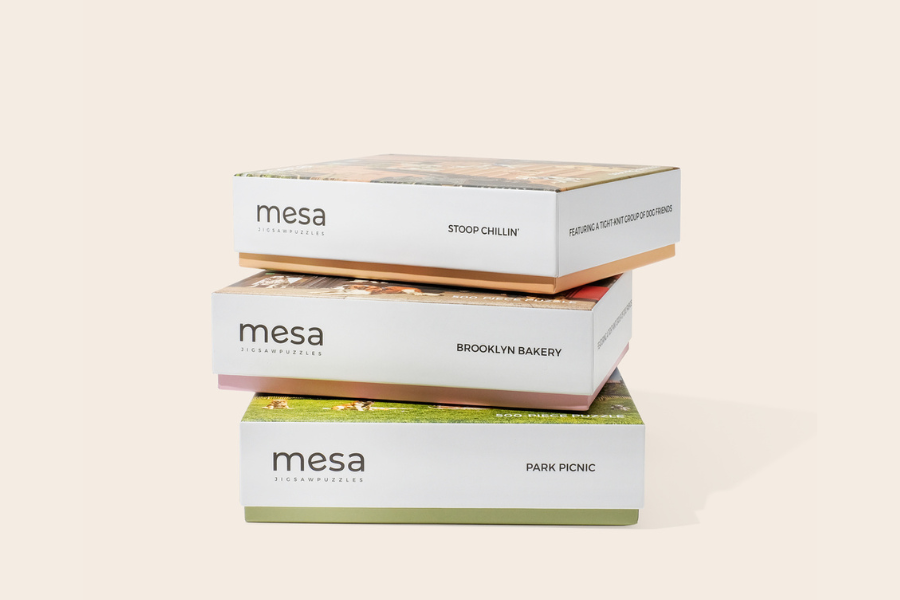Any puzzler knows that once you really start to embrace the activity, it can be easy to start accumulating a large collection. Of course, many puzzlers enjoy keeping their completed puzzles by gluing them together and hanging them, but most of us will end up disassembling at least some of them.
Between boxes of multiple sizes, pets and children, and space limitations, keeping all of your puzzles untouched and nicely organized can be a challenge. Fortunately, there are plenty of tips and tricks to keep your jigsaw puzzles safe and organized, whether you’re currently working on them or have put them aside for another day.
Key Takeaways
- Consider the size of your puzzle collection and what containers will properly fit everything in an organized way.
- There are different factors to consider when it comes to storing in-progress puzzles and completed puzzles.
- When you’re looking into puzzle storage, think of what options are most uniform and work with the space in your home and the size of your collection.
Tips for Puzzle Storage
Before we look at some of the specific storage options for puzzlers, consider some of these tips for organizing and storing your puzzles.
Get Rid of the Boxes
Puzzle boxes are often overly bulky and vary in size. In addition to simply taking up a lot of wasted space, puzzle boxes can also be easily ruined. Consider cutting out the cover of the puzzle box with an Exacto knife. You can keep a sturdy picture of the puzzle with it, so you know what the puzzle looks like as you put it together. Some puzzles also have an additional paper photo of the puzzle inside the box, so you can always keep that one instead or both.
Figure Out the Size of Your Puzzles for Storage
There are plenty of discreet, low-profile options for puzzle storage — you just want to be sure that your puzzles will fit before you go shopping. If you have a variety of puzzle sizes, make sure that whatever uniform storage option you choose allows you the entire range of your collection.
Create a Uniform System for Puzzle Storage
You should also figure out how many total jigsaw puzzles you plan to store, which will likely help to determine what method will work best for storing. Rather than storing puzzles in a variety of places, it is best to stick to one. This will help to keep puzzles more organized and limit the amount of space they take up.
Storing Jigsaw Puzzles in Progress
When storing in-progress puzzles, you have a number of options. The right one for you often depends on the space you have.
Sorting Trays
Puzzle sorting trays are a great option for in-progress puzzles, especially if you have limited space. They are not only helpful for more challenging puzzles, but they make the process of packing up your puzzle much easier. Rather than dumping all the sorted pieces back into the box, you can simply transport them to trays with corresponding pieces to return to whenever you start back up again.
Puzzle Board
A puzzle board is another quality choice, and many also have built-in sort trays, giving you a large space to work on your puzzle and another to organize sorted pieces. The only caveat with a puzzle board is that you will likely need a surface or table to store it on. If you have pets or children, you may want to find a space high enough where they will not be able to reach the puzzle board when left unattended.
Roll-Up Puzzle Mat
A puzzle mat is an ideal option for people with limited space. The concept is like a puzzle board, but instead of a hard flat surface, you’ll work on a large cloth. When you’re all done for the day, you’ll roll up the puzzle mat with a large cylinder — often inflated with air — and then secure it with bands. This option is a bit more versatile when it comes to storage, as it does not have to lay flat.
Storing Completed Jigsaw Puzzles
We recommend going with a uniform method, with all of your puzzles in the same place. The amount of space your puzzles take up may depend on the size of your collection and the method you choose, so keep in mind what works best with your home and the space you have to use.
Plastic Zipper Bags
Plastic zipper bags are a great way to store puzzles with limited storage. You can use large Ziploc bags, or you may also opt for clear or opaque pouches. This eliminates the bulk of puzzle boxes, but we still recommend keeping a copy of the full image with the bagged puzzle. You should still keep all the bags in one place, whether that be a cupboard, container, or basket.
Clear Flat Containers
Clear, stackable containers are another solid option for puzzle storage. You’ll want to make sure you don’t go too large, but there are plenty of small options perfect for storing anywhere between 500- to 2,000-piece puzzles. If you are storing your puzzles loose in flat containers, avoid storing multiple puzzles in the same container. You may combine a number of these options, like putting multiple bagged puzzles into one container or using specific containers for sorting (by picture theme or piece amount, for example).
Drawers
You can also find storage drawers for your puzzles. There are plenty of smaller drawer options, allowing for loose puzzle storage all in one place. You can also use drawers in combination with bags or containers to further sort your puzzles. Just try to avoid storing multiple loose puzzles in the same drawer. This can be a great option if you have a game room or need storage space for other activities, too.
Final Thoughts
It can be daunting to see the puzzle boxes pile up as your collection grows, but there are plenty of storage options to limit space and keep all your puzzles handy. Puzzles in progress and completed puzzles take different strategies, but both have a variety of avenues to choose that not only limit storage space but help to keep everything organized.
It may take a little elbow grease, but you’ll find that just a little work can go a long way when it comes to puzzle storage, and you’ll only enjoy the benefits of consolidating as you continue your puzzle journey!



